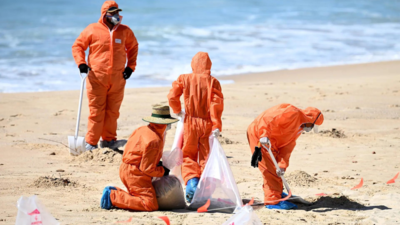
In October, several beaches in Sydney's eastern suburbs were closed after mysterious dark spherical objects washed up on the shore, as more of the balls continued to appear, authorities took action to close several beaches for safety.
According to Randwick Council, the initial reports had suggested that those balls were Tar balls, a hydrocarbon-based pollutant. Louise Morris, oil and gas campaign manager at the Australian Marine Conservation Society had explained that tar balls are blobs of petroleum that have travelled through the ocean, collecting debris due to their sticky nature.
But the scientists at the University of New South Wales determined these objects were '
fatbergs
', consisting of a nauseating mixture of sewage, hair, cooking oils, chemical substances, fatty compounds, illegal substances and other materials.
Associate Professor John Beves described their odour to 9News as "absolutely disgusting", noting it was worse than any other known smell. These 'fatbergs' typically develop in sewerage systems when non-dissolving materials accumulate and bond together.
The incident led to the closure of eight Sydney beaches after these peculiar objects appeared. The Randwick City Council initially suspected them to be unrefined oil deposits, possibly from a spillage, as reported by 9News.
The research team noted that whilst each object had a solid exterior and softer interior, they varied slightly in composition.
"This was a significant analytical challenge, with highly complex mixtures containing hundreds to thousands of components," Analytical Chemist Professor William Alexander Donald told 9News.
"We had a lot of fun analyzing these mystery blobs, using deductive reasoning to trace the likely source to human waste."
According to the NSW Environmental Protection Authority's media statement, the precise source remains undetermined due to the objects' complex composition and their prolonged exposure to seawater.
The EPA noted that Sydney Water confirmed no known issues with the city's waste management systems. Whilst the EPA continues its independent analysis of the objects' composition, researchers suggest more such waste matter could potentially appear on Sydney's beaches until the source is identified.

 1 month ago
12
1 month ago
12









